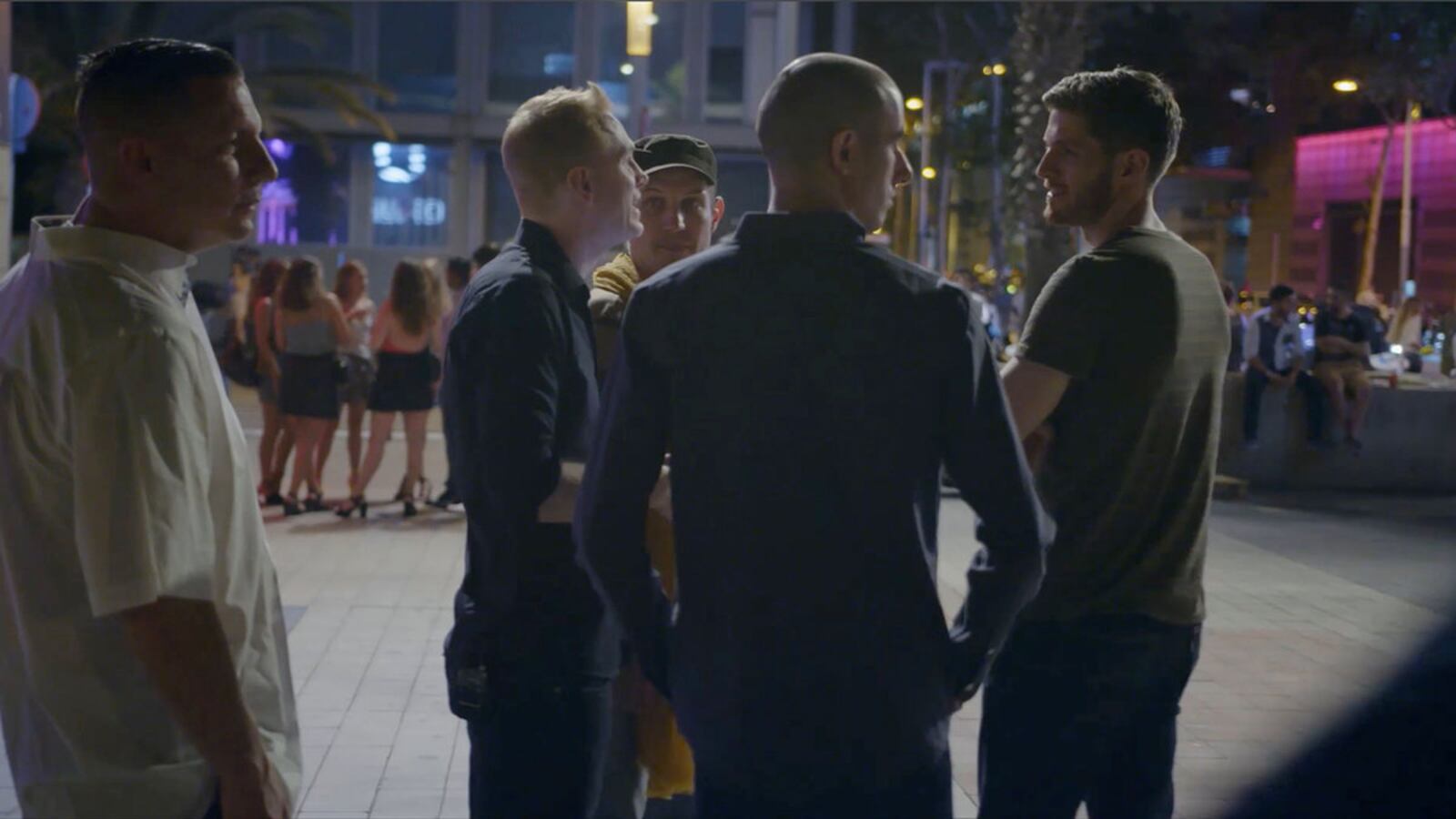A concise disclaimer runs at the beginning of the new documentary The Pickup Game, premiering in New York on Nov. 8. “This documentary includes a number of ‘pickup’ techniques and strategies,” it reads. “These have been included for discussion and illustrative purposes only. The Producers and their affiliates do not endorse or approve of these messages in any way.”
The Pickup Game is based on the controversial bestselling book by Neil Strauss called The Game. The book exposed the underground pickup industry that grew from confidence-building dating tutorials into a network of companies rooted in misogyny and led by “alpha-male instructors” promising to teach men how to trick women into sleeping with them. It is exactly as nauseating as it sounds.
Directed by Matthew and Barnaby O’Connor, The Pickup Game features footage from pickup “bootcamps,” hidden camera clips of “artists” testing out their techniques on real women, and interviews with famous pickup instructors such as Paul Janka and Erik Von Markovik. The latter, who goes by the alias “Mystery,” proudly demonstrates that when you ask Siri to show you a picture of a pickup artist, his is the first image to come up.
The “techniques and strategies” detailed in the 96-minute film are essentially a set of manipulative conversational tricks that are commonly practiced in the pickup community, like a memorized “opener” to start a conversation with a stranger and “negging,” or giving a woman a backhanded compliment. Inhabitants of this little-known world communicate in an entirely foreign language, one of abbreviations and acronyms designed to make predatory behavior sound academic, like some kind of pervy pseudo-psychology.
On top of openers and negging, there is also “DHV,” which means “demonstration of higher value” and refers to the way an insecure pickup “student” might imitate what he perceives to be the behavior of a “higher status” male. “Approach anxiety” is the cutesy nickname for when a man is uncomfortable with the idea of approaching and immediately becoming physical with a stranger on the street. Rather than a totally normal response to an unnatural social situation, this is considered a sign of weakness that men must overcome if they ever want to have sex.
And then there is the “false time constraint” method in which a pickup artist (I shudder every time I have to refer to these sleazeballs as “artists”) tells a woman he only has a few minutes to talk before he needs to be somewhere else, easing the awkwardness of conversing with a complete stranger and making his target feel less cornered. This technique is more commonly known as lying.
The point of exposing all of this is not to offer women a cautionary guide to the kind of sneaky tricks any man might effectively deploy (though it is probably worth the watch for the five remaining unjaded women in the world who genuinely believe the men who hit on them at bars have their best interests in mind). Instead, the film argues that the multimillion-dollar pickup industry thrives not because the insane methods preached at $3,000 bootcamps actually work, but largely because of marketing scams.
An anonymous former marketing expert for the industry, who goes by the pseudonym Michael M., describes how the hidden camera videos instructors use as proof of their success in the field are misleadingly edited. Often for every shot of a successful pickup, there are 95 unused shots of the instructor striking out, Michael M. explains.
Some companies will cheat the system further by hiring actresses to pretend to be the targets in promotional videos, or even recruiting escorts to engage with students at boot camps, creating the false impression that their newly acquired knowledge was worth the hefty price tag. Once the students believe their pickup education is working, they are willing to shell out more cash for other programs.
Still, The Pickup Game could have and probably should have been more emphatic in its condemnation of the dark implications of this coercive, misogynistic industry. Only in its final 20 minutes does the documentary grapple with the sexual violence inevitable in a practice led by men like Bruce Roth, a New York-based dating instructor who told a room full of students that he likes dating Asian women because they are “obedient, good little dogs” and Julien Blanc, dubbed the “most hated man in the world” for tweeting things like “Man, I will teach you how to ‘shatter’ her lack of consent. Pay me and rape them all.”
The film’s final act details a horrifying 2016 rape case that resulted in three members of the online pickup artist community—Alex Smith and Jonas Dick, instructors working for the Efficient Pickup company, and Jason Berlin, a student—each being sentenced to eight years in prison. The men had documented the details of their gang rape of a heavily intoxicated, barely conscious woman in disturbing blog posts. According to the film and the blog posts, the men were laughing during and after the attack. “This is fucking hilarious,” Berlin wrote.
It’s surprisingly easy to grow desensitized to guys with terrible facial hair blatantly objectifying women for an hour and a half. And it is also tempting to dismiss the men onscreen as pathetic and embarrassing, even to laugh at them. A whole separate article could be written about the cringe-worthy, telling fashion choices the men in the pickup community make. An open black magician’s vest over a white button-down shirt? Sure. Fedora and matching nail polish? Why not. Teeny, tiny man-bun? Practically a pickup artist requirement.
But the reality is that the pickup game is about something far more sinister than sad men who are afraid of rejection; it is an industry built on blurring the lines of consent. The Pickup Game could have done more to remind us of that.






